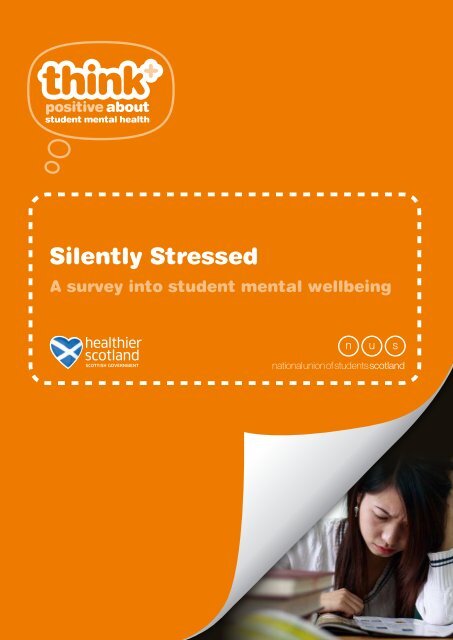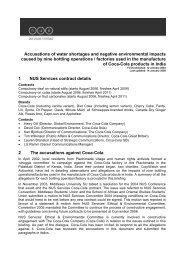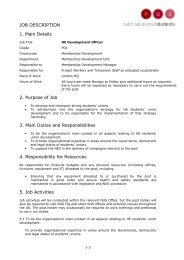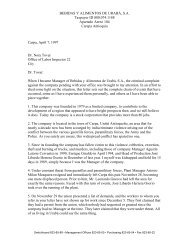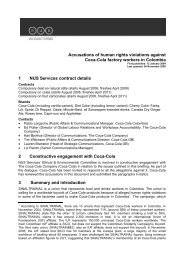Silently Stressed - a survey into student mental wellbeing
Silently Stressed - a survey into student mental wellbeing
Silently Stressed - a survey into student mental wellbeing
Create successful ePaper yourself
Turn your PDF publications into a flip-book with our unique Google optimized e-Paper software.
<strong>Silently</strong> <strong>Stressed</strong>:<br />
A <strong>survey</strong> <strong>into</strong> <strong>student</strong> <strong>mental</strong> <strong>wellbeing</strong><br />
<strong>Silently</strong> <strong>Stressed</strong><br />
A <strong>survey</strong> <strong>into</strong> <strong>student</strong> <strong>mental</strong> <strong>wellbeing</strong>
Contents<br />
Foreword 02<br />
Executive Summary 03<br />
How the <strong>survey</strong> was completed 06<br />
The <strong>student</strong> demographic 06<br />
Where they studied 06<br />
Year of study 06<br />
Gender 07<br />
General findings 07<br />
The research 08<br />
2. Exams and assessments 09<br />
Recommendation 09<br />
Case study 10<br />
3. Considering career prospects 11<br />
Recommendation 11<br />
4. Having enough money to get by 12<br />
Recommendation 12<br />
5. Working a paid job 13<br />
Recommendation 13<br />
6. Where do <strong>student</strong>s go for support? 14<br />
Recommendation 15<br />
Research <strong>into</strong> <strong>student</strong> support services 15<br />
Recommendations 16<br />
Case study 16<br />
Case study 18<br />
7. What stops <strong>student</strong>s from asking for support? 19<br />
Recommendation 19<br />
8. Conclusions 20
<strong>Silently</strong> <strong>Stressed</strong>:<br />
A <strong>survey</strong> <strong>into</strong> <strong>student</strong> <strong>mental</strong> <strong>wellbeing</strong><br />
Foreword<br />
Many <strong>student</strong>s begin<br />
university or college<br />
with the expectation<br />
of it being the ‘best<br />
years of your life.’<br />
But what if this is not<br />
the case?<br />
The general perception of <strong>student</strong> life<br />
being a carefree, social and relaxed time<br />
of life is hugely misguided. With increasing<br />
financial hardship, a lack of graduate<br />
employment opportunities and the need<br />
to balance studies, paid employment and<br />
skills development, the pressures on a<br />
<strong>student</strong>s’ <strong>mental</strong> <strong>wellbeing</strong> are many and<br />
substantial. We already know that 1 in 4<br />
people will suffer from <strong>mental</strong> ill health at<br />
some point in their lives and this applies<br />
to the <strong>student</strong> community too. That is over<br />
160,000 <strong>student</strong>s in Scotland. However,<br />
we can make education more accessible<br />
to those with <strong>mental</strong> ill health and, by<br />
recognising the issues <strong>student</strong>s face, can<br />
perhaps prevent stress or worry becoming<br />
a longer term <strong>mental</strong> health diagnosis.<br />
NUS Scotland has been awarded funding<br />
by the Scottish Government in recognition<br />
of the growing issue of <strong>mental</strong> ill health<br />
amongst the <strong>student</strong> population. The<br />
project we have taken forward, Think<br />
Positive, has already started to make an<br />
impact. Think Positive has been working<br />
with <strong>student</strong>s’ associations across<br />
Scotland to provide training in Scottish<br />
Mental Health First Aid and campaigning<br />
and to provide <strong>student</strong>s with the tools to<br />
look after their own <strong>mental</strong> <strong>wellbeing</strong> and<br />
recognise <strong>mental</strong> ill health in others. But<br />
there is much more to do.<br />
This research report details the outcomes<br />
of NUS Scotland’s Student Stress Survey,<br />
which was completed by <strong>student</strong>s across<br />
the country. The results of the <strong>survey</strong><br />
are a real cause for concern and make<br />
a clear call for immediate action and<br />
better investment by institutions. NUS<br />
Scotland has found that a high proportion<br />
of <strong>student</strong>s are significantly stressed by<br />
exams, thoughts of their future careers and<br />
financial strain. What is more concerning is<br />
that the majority of <strong>student</strong>s are unlikely to<br />
come forward for any form of professional<br />
support. Instead they are likely to continue<br />
to be stressed in silence.<br />
The recommendations in this paper<br />
include actions that NUS Scotland would<br />
encourage institutions, <strong>mental</strong> health<br />
organisations and the Government to<br />
implement in order to create an adequately<br />
supported and <strong>mental</strong>ly healthier <strong>student</strong><br />
population.<br />
It is the duty of universities, colleges and<br />
governing bodies to eradicate the barriers<br />
which prevent <strong>student</strong>s from reaching their<br />
full potential in education, particularly when<br />
these are barriers that may have an impact<br />
on their <strong>mental</strong> <strong>wellbeing</strong> for the rest of<br />
their lives.<br />
Jennifer Cádiz<br />
Depute President<br />
Executive Summary<br />
Many universities, colleges and <strong>mental</strong> health agencies have recognised<br />
the growing issue of <strong>student</strong> <strong>mental</strong> ill health. However little research<br />
exists to tell us why <strong>mental</strong> ill health is on the increase among <strong>student</strong>s<br />
and what issues in particular concern them. In recognition of this, NUS<br />
Scotland conducted research <strong>into</strong> <strong>student</strong> stress and support. The<br />
<strong>survey</strong> was completed by over 1800 <strong>student</strong>s from 19 colleges and<br />
15 universities across Scotland. The <strong>survey</strong> asked <strong>student</strong>s to identify<br />
which issues caused them stress while studying, where they would turn<br />
to for support and what, if anything, acts as a barrier to them in coming<br />
forward for support for a <strong>mental</strong> health concern.<br />
Exams and assessments<br />
Examinations were found to be the<br />
biggest concern for <strong>student</strong>s. An<br />
overwhelming 90% of <strong>student</strong>s reported<br />
this caused them more stress than<br />
expected. Less than 2% reported exams<br />
and assessments did not cause them<br />
stress at all.<br />
Recommendations<br />
• Institutions should review the balance<br />
of coursework and assessment<br />
and ensure that there is ample<br />
communication between departments<br />
to prevent overlap in examinations<br />
and submission dates.<br />
Future careers<br />
Over 75% of <strong>student</strong>s reported that<br />
considering their future career prospects<br />
after completion of their current studies<br />
was either reasonably or very stressful. It<br />
is likely that this looming worry of future<br />
employment has an impact on the pressure<br />
<strong>student</strong>s feel regarding their examinations<br />
and academic performance and add to the<br />
stress they feel through their assessments.<br />
Recommendations<br />
• Universities and colleges need to provide<br />
greater levels of support to <strong>student</strong>s to<br />
find work after finishing their studies and<br />
provide networking opportunities with<br />
prospective employers.<br />
• Institutions must make moves to advise<br />
<strong>student</strong>s on the job market early in their<br />
tertiary education.<br />
02<br />
03
<strong>Silently</strong> <strong>Stressed</strong>:<br />
A <strong>survey</strong> <strong>into</strong> <strong>student</strong> <strong>mental</strong> <strong>wellbeing</strong><br />
Having enough money to get by<br />
Financial stress was reported by almost<br />
70% of the <strong>student</strong>s <strong>survey</strong>ed. The <strong>survey</strong><br />
asked whether <strong>student</strong>s felt that having<br />
enough money to get by day to day was<br />
stressful for them. A majority reported this<br />
to be the case, while only 9% reported not<br />
having financial stress.<br />
Recommendations<br />
• Students deserve adequate financial<br />
support that does not hinder their<br />
academic performance or increase<br />
the risk of <strong>mental</strong> ill-health. We believe<br />
<strong>student</strong>s should be provided with a<br />
minimum income of £7000 to ensure<br />
access to education is based on<br />
academic ability not the ability to pay.<br />
• Students should be given sufficient<br />
advice on budgeting and finance from<br />
the start of their academic experience.<br />
Working a paid job<br />
When asked about balancing academic life<br />
with other life pressures, 50% of <strong>student</strong>s<br />
<strong>survey</strong>ed found working a paid job while<br />
studying ‘reasonably’ or ‘very’ stressful.<br />
Recommendations<br />
• Institutions need to recognise that too<br />
many <strong>student</strong>s are working beyond<br />
the recommended 10 hours per week<br />
and provide them with the support and<br />
advice they require to reach their full<br />
academic potential.<br />
Asking for support<br />
The report has found that a high number<br />
of <strong>student</strong>s would not come forward<br />
in asking for professional support if<br />
and when they needed it. Only 30%<br />
reported feeling comfortable disclosing<br />
their concerns to an academic and less<br />
than 20% were willing to approach the<br />
support services in their institution. Of<br />
greater concern is that, less than 7%<br />
would turn to external agencies or help<br />
lines such as the Samaritans if they felt<br />
they were in need of immediate support.<br />
Recommendations<br />
• Universities and colleges should<br />
consider providing <strong>mental</strong> health<br />
related training for lecturing staff,<br />
enabling them to provide immediate<br />
support and referral if and when<br />
required.<br />
Barriers to asking for support<br />
When asked what issues <strong>student</strong>s felt<br />
prevented them from asking for personal<br />
support, an overwhelming 80% reported<br />
that the stigma attached to <strong>mental</strong> illness<br />
would act as a barrier in approaching<br />
someone for support.<br />
Recommendations<br />
• Universities and colleges must<br />
work with their respective <strong>student</strong>s’<br />
associations to consider ways in which<br />
barriers to asking for support may be<br />
removed.<br />
The reality of support services<br />
Earlier in the year NUS Scotland <strong>survey</strong>ed<br />
<strong>student</strong> support and counselling services<br />
in institutions across Scotland. Of the 24<br />
institutions that took part, 75% reported<br />
that the number of <strong>student</strong>s in need of<br />
<strong>mental</strong> health support had increased<br />
since the previous academic year. More<br />
worrying, over half of colleges <strong>survey</strong>ed<br />
did not have any <strong>mental</strong> health support<br />
provision and felt they were unable<br />
to provide sufficient support to their<br />
<strong>student</strong>s. In contrast all universities had<br />
<strong>mental</strong> health specific support, however<br />
40% still felt they were unable to meet<br />
demand.<br />
Recommendations<br />
• The education sector is likely to face<br />
severe funding pressures in the near<br />
future, however support services and<br />
pastoral care must not be cut as an<br />
easy method of saving money. On<br />
the contrary this is an area that has<br />
required, and continues to require,<br />
further investment and development.<br />
04 05
<strong>Silently</strong> <strong>Stressed</strong>:<br />
A <strong>survey</strong> <strong>into</strong> <strong>student</strong> <strong>mental</strong> <strong>wellbeing</strong><br />
How the <strong>survey</strong> was<br />
completed<br />
The <strong>survey</strong> was designed in collaboration<br />
with the Think Positive Project steering<br />
group, with representatives from the<br />
Samaritans, See Me, and NHS Scotland,<br />
as well as <strong>student</strong>s themselves. By<br />
involving key stakeholders we were able<br />
to ensure we asked relevant and clear<br />
questions.<br />
The <strong>survey</strong> was completed by participants<br />
both online and in hardcopy. University<br />
and college <strong>student</strong>s associations across<br />
Scotland worked to encourage <strong>student</strong>s<br />
to complete the <strong>survey</strong> through emails,<br />
other written communications, face to<br />
face contact, and by providing direct links<br />
on their websites for <strong>student</strong>s to complete<br />
it online. NUS Scotland also visited<br />
institutions and provided <strong>student</strong>s with<br />
the opportunity to complete the <strong>survey</strong> in<br />
person.<br />
All <strong>student</strong>s were given an explanation as<br />
to the purpose and content of the <strong>survey</strong><br />
and where the information would be used.<br />
The <strong>student</strong> demographic<br />
1,872 <strong>student</strong>s from 19 colleges and<br />
15 university campuses took part in the<br />
<strong>mental</strong> health stressor <strong>survey</strong>. The <strong>survey</strong><br />
is the biggest and most diverse piece<br />
of research to be carried out on <strong>student</strong><br />
<strong>mental</strong> health in Scotland.<br />
Where they studied<br />
23%<br />
1380 participants were from universities,<br />
428 from colleges and 64 did not specify<br />
where they study.<br />
Year of study<br />
13%<br />
18%<br />
11%<br />
3%<br />
16%<br />
16%<br />
74%<br />
26%<br />
University<br />
College<br />
Unspecified<br />
Third<br />
The findings reflected a spread of<br />
<strong>student</strong>s from different year groups and<br />
levels of studies.<br />
HNC/HND/Access<br />
First<br />
Second<br />
Forth<br />
Postgradaute<br />
Gender<br />
32%<br />
.003% 1%<br />
The majority of <strong>student</strong>s who completed<br />
the <strong>survey</strong> were female (1218 or 65%).<br />
A greater number of female respondents<br />
is likely to reflect wider additional stigma<br />
among men regarding <strong>mental</strong> health.<br />
General findings<br />
67%<br />
Female<br />
Male<br />
Other Gender<br />
Identity<br />
Unspecified<br />
It has been shown time and time again<br />
that high levels of stress can lead to<br />
heightened <strong>mental</strong> health problems,<br />
which often have negative physical health<br />
effects. Our research found that levels<br />
of stress are very high in the <strong>student</strong><br />
population. Students feel particularly<br />
stressed by their academic assessments,<br />
financial pressures and self image. While<br />
attending university or college will, by<br />
definition, lead to periods of time when<br />
<strong>student</strong>s feel under pressure, it is clear<br />
from this research that financial worries<br />
and concerns about future career<br />
prospects are additional stress factors felt<br />
by <strong>student</strong>s across the board.<br />
Equally concerning was that those<br />
<strong>student</strong>s experiencing <strong>mental</strong> ill-health<br />
were highly unlikely to turn to any form<br />
of professional support. Though they<br />
were willing to go to friends or family for<br />
support, only a small minority would turn<br />
to their academic mentors or a lecturer<br />
and a very low number would look for<br />
support from professional help lines.<br />
06 07
<strong>Silently</strong> <strong>Stressed</strong>:<br />
A <strong>survey</strong> <strong>into</strong> <strong>student</strong> <strong>mental</strong> <strong>wellbeing</strong><br />
The research<br />
What aspects of <strong>student</strong> life stressed them?<br />
Table 1 – Key Stress Issues for Students<br />
Issues<br />
We asked <strong>student</strong>s what the most<br />
stressful factors were for them in their<br />
lives. The table above outlines the main<br />
issues that <strong>student</strong>s described as either<br />
‘reasonably’ or ‘very’ stressful. It is clear<br />
that exams and assessments are very<br />
stressful for <strong>student</strong>s, with the vast<br />
majority of respondents reporting that<br />
they felt stressed by these.<br />
However, financial issues and concerns<br />
around future prospects were not far<br />
% who believe this to be ‘reasonably’ or ‘very’ stressful<br />
Exams and assessments 90.5%<br />
Considering career prospects 75.2%<br />
Managing time and deadlines 83.3%<br />
Self image 54.6%<br />
Paying rent and bills 48.7%<br />
Having enough money to get by 68.2%<br />
Dealing with <strong>student</strong> loans 38%<br />
Dealing with commercial debt 35.2%<br />
Working a paid job<br />
50%<br />
behind in terms of stress factors for<br />
<strong>student</strong>s.<br />
Almost 30% of <strong>student</strong>s felt that four<br />
key issues; exams, considering career<br />
prospects, having enough money to<br />
get by and working a paid job were<br />
considerably stressful and had a<br />
negative impact on their lives.<br />
This report will consider these findings<br />
in detail and look <strong>into</strong> each key stress<br />
factor individually.<br />
2. Exams and<br />
assessments<br />
The stress caused by exams and<br />
assessments was reported by <strong>survey</strong><br />
participants as very high, with over 90<br />
per cent of respondents citing this as<br />
a significant stress. Although it can<br />
be expected that assessments would<br />
cause a certain level of anxiety, it was<br />
unexpected that so many <strong>student</strong>s would<br />
find them to be so difficult. While a certain<br />
level of stress is inherent in undertaking<br />
exams and coursework, institutions must<br />
be careful not to apply too much pressure<br />
to <strong>student</strong>s, or unnecessary amounts, as<br />
additional pressure and stress may impair<br />
a <strong>student</strong>s’ academic performance in<br />
assessments.<br />
For an overwhelming majority of <strong>student</strong>s,<br />
the stress of exams and assessments is<br />
very significant. We believe universities<br />
and colleges need to reconsider the<br />
types of assessments used to gauge<br />
academic performance, and consider<br />
ways in which <strong>student</strong>s can be assessed<br />
without being overwhelmed and without<br />
having an assessment timetable which<br />
adds unnecessary and unhealthy<br />
pressure. Given the flexibility promoted<br />
in modern teaching it is no longer<br />
acceptable or excusable for <strong>student</strong>s to<br />
have an academic calendar which does<br />
not reflect the needs of the learner and<br />
does not take <strong>into</strong> account their learning<br />
experience in the greater sense.<br />
Recommendation<br />
• Institutions should constantly review the<br />
balance of coursework and assessment<br />
and consider what impact this is<br />
having on all aspects of the <strong>student</strong><br />
experience.<br />
• Institutions should ensure there is<br />
ample communication between<br />
departments to prevent overlap in exam<br />
and coursework submission dates,<br />
preventing <strong>student</strong>s feeling high levels<br />
of pressure at one time.<br />
08 09
<strong>Silently</strong> <strong>Stressed</strong>:<br />
A <strong>survey</strong> <strong>into</strong> <strong>student</strong> <strong>mental</strong> <strong>wellbeing</strong><br />
Case study<br />
Student<br />
Course: Electrical and Mechanical<br />
Engineering (UG)<br />
Academic pressure<br />
Throughout my degree, I have felt very<br />
stressed on numerous occasions as it<br />
was not unusual to have many deadlines<br />
in the same week and because of this I<br />
was in a situation where I had to follow<br />
my timetable and try and keep up with<br />
different classes and on top of this<br />
meet deadlines. This meant that I would<br />
always be working from 9AM to 1AM<br />
and despite all this effort I was usually<br />
behind on tutorials for all my classes.<br />
I’ve always found this stressful because<br />
I felt that I never had time to relax or<br />
breathe even on weekends as there<br />
was so much work to be done and this<br />
situation is a lot worse in the final weeks<br />
of the semester.<br />
Other things I found very stressful were<br />
when I had multiple exams in the same<br />
week, sometimes up to 3 or 4 in a row,<br />
and due to breadth of material I had to<br />
revise, I worried a lot about the exams<br />
that I just didn’t have time to study for<br />
as I knew I would do terrible in those<br />
classes.<br />
I considered, on many occasions,<br />
switching degrees, taking a year out<br />
or even taking medication to combat<br />
my chronic stress and depression but I<br />
never did.<br />
How could your institution improve?<br />
As this degree is an interdisciplinary<br />
degree between two different<br />
departments, there is a lack of<br />
communication on when deadlines and<br />
exams are set and I would even go as far<br />
as saying that these departments lack<br />
sympathy for <strong>student</strong>s and consider this<br />
amount of pressure to be the norm.<br />
% of <strong>student</strong>s<br />
3. Considering career<br />
prospects<br />
Students who found considering career<br />
prospects ‘reasonably’ or ‘very’ stressful.<br />
100<br />
80<br />
60<br />
40<br />
20<br />
0<br />
74.3%<br />
HNC/HND/Access<br />
70.3%<br />
First<br />
69.3%<br />
Second<br />
Year of study<br />
Surveyed <strong>student</strong>s, regardless of their<br />
year of study, found considering career<br />
prospects a significant cause of stress<br />
while at university or college. Given the<br />
current economic landscape and the<br />
struggle many <strong>student</strong>s will expect in<br />
finding a job upon graduation, it is not<br />
surprising that the idea of finding a job<br />
after graduation is stressful. The levels of<br />
stress reported rose for those finishing<br />
their studies. 86% of fourth year <strong>student</strong>s<br />
reported stress regarding their future<br />
prospects as compared with 70% for first<br />
year <strong>student</strong>s. It is clear that the looming<br />
nature of graduating and finding a job<br />
clearly has a negative effect on stress<br />
levels.<br />
77.4%<br />
Third<br />
86.3%<br />
Fourth<br />
84.2%<br />
Postgraduate<br />
Over the past few years there has been a<br />
shift in academia towards incorporating<br />
employability skills <strong>into</strong> curriculums in an<br />
effort to create what is known as the ‘21st<br />
century graduate. However, while this<br />
push to support <strong>student</strong>s in becoming<br />
employable is welcomed, it may also<br />
have indirectly heightened the pressure<br />
<strong>student</strong>s feel in terms of the career they<br />
should aspire to.<br />
Recommendation<br />
• Universities and colleges need to<br />
provide greater levels of support to<br />
<strong>student</strong>s to find work after finishing<br />
their studies and ensure there are ample<br />
opportunities for <strong>student</strong>s to network<br />
with prospective employers.<br />
• Students should be given advice about<br />
the job market and how it will impact<br />
them. This should be done early in<br />
their tertiary education to manage<br />
expectations and ensure <strong>student</strong>s are<br />
aware of the realities that they face<br />
and the diverse range of opportunities<br />
available to them.<br />
10 11
<strong>Silently</strong> <strong>Stressed</strong>:<br />
A <strong>survey</strong> <strong>into</strong> <strong>student</strong> <strong>mental</strong> <strong>wellbeing</strong><br />
4. Having enough<br />
money to get by<br />
Almost 70% of <strong>student</strong>s believed that<br />
ensuring they had enough money for day<br />
to day living was a stress factor for them.<br />
This is in line with previous research. NUS<br />
Scotland’s Overstretched and Overdrawn<br />
report, published in 2009, found that the<br />
majority of <strong>student</strong>s were in some form of<br />
debt. NUS Scotland has, for some time,<br />
been campaigning to increase <strong>student</strong><br />
funding support. Our latest research<br />
<strong>into</strong> <strong>student</strong> hardship, Still in the Red,<br />
released in September 2010, found that<br />
nearly a third of <strong>student</strong>s “frequently”<br />
worried about their finances and a further<br />
28% saying they worried all the time.<br />
Furthermore, nearly two thirds (62%)<br />
of all <strong>student</strong>s said that not receiving<br />
enough money in <strong>student</strong> support was<br />
having a negative impact on their studies<br />
(Still in the Red, 2010). This is also<br />
reflected in the Think Positive research,<br />
as over a third of <strong>student</strong>s found <strong>student</strong><br />
loans or commercial debt significantly<br />
stressful.<br />
The Scottish Association of Mental Health<br />
(SAMH) recently published a report<br />
finding that people facing economic<br />
concerns due to the recession were eight<br />
times more likely to seek help for anxiety<br />
or depression. This link is worrying, given<br />
the scale of <strong>student</strong> hardship in Scotland.<br />
Recommendation<br />
• Students need to be given the financial<br />
help they need to concentrate on their<br />
studies without worries about money<br />
hindering academic performance<br />
or increasing the risk of <strong>mental</strong> illhealth.<br />
We believe <strong>student</strong>s should be<br />
provided with a minimum income of<br />
£7000 to ensure access to education<br />
is based on academic ability not the<br />
ability to pay.<br />
• Students should be given sufficient<br />
advice on budgeting and finance from<br />
the start of their academic experience.<br />
5. Working a paid job<br />
The <strong>survey</strong> found that 50% of the<br />
<strong>student</strong>s <strong>survey</strong>ed found working a paid<br />
job while studying ‘reasonably’ and ‘very’<br />
stressful. NUS Scotland’s Still in the Red<br />
<strong>survey</strong> 2010 found that 50% of full time<br />
<strong>student</strong>s were working for additional<br />
income alongside their studies. Of these,<br />
68% were working more than 10 hours<br />
per week. 19% were working more than<br />
20 hours per week and 5% were working<br />
more than 30 hours per week.<br />
The Committee of Inquiry <strong>into</strong> Student<br />
Finance (the Cubie report 1999)<br />
recommended that full-time <strong>student</strong>s<br />
should not work more than ten hours<br />
a week as working more than this<br />
would risk a detri<strong>mental</strong> effect on their<br />
academic performance. It is therefore<br />
unsurprising that 50% of <strong>student</strong>s<br />
<strong>survey</strong>ed found this a stressful balance<br />
to maintain. Trying to maintain paid<br />
employment while attending lectures,<br />
completing coursework and revising for<br />
assessments is likely to be a stressful<br />
and highly pressured experience for<br />
any <strong>student</strong>. As such, returning to the<br />
recommendation made previously<br />
regarding a minimum income, <strong>student</strong>s<br />
should be entitled the basic financial<br />
support necessary to allow them to fully<br />
focus on their studies.<br />
Recommendation<br />
• Institutions need to be able to<br />
recognise those <strong>student</strong>s who are<br />
working beyond the recommended 10<br />
hours per week and provide them with<br />
the support and advice they require.<br />
Furthermore, institutions need to be<br />
able to recognise <strong>student</strong>s struggling<br />
with the fine balance between paid<br />
work and their studies.<br />
12 13
<strong>Silently</strong> <strong>Stressed</strong>:<br />
A <strong>survey</strong> <strong>into</strong> <strong>student</strong> <strong>mental</strong> <strong>wellbeing</strong><br />
% of <strong>student</strong>s<br />
6. Where do <strong>student</strong>s<br />
go for support?<br />
60<br />
50<br />
40<br />
30<br />
20<br />
10<br />
0<br />
55.8%<br />
Family<br />
54.9%<br />
29.4%<br />
Friends<br />
Academic mentor<br />
17.3%<br />
Institution’s counselling<br />
Support Service<br />
11.3%<br />
Students’ association<br />
6.8%<br />
37.5%<br />
External organisations<br />
GP<br />
Academic mentor<br />
When asked if they would approach<br />
an academic mentor, or staff member<br />
responsible for academic progress, many<br />
respondents suggested that they were<br />
either inaccessible or that their relationship<br />
was not strong enough to approach them.<br />
Given that <strong>student</strong>s tend to interact with<br />
academic staff most regularly, it is possible<br />
that they may be the first point of call for<br />
<strong>student</strong>s if they are experiencing difficulties.<br />
However, less than a third of <strong>student</strong>s<br />
would consider asking for their support.<br />
“I’d be hesitant to go to them with<br />
problems if they think that it will negatively<br />
impact on my place on the course”<br />
“My <strong>student</strong> advisor is absolutely<br />
incredible. I can go to her with any<br />
problem and she listens and helps any<br />
way she can.”<br />
HNC college <strong>student</strong><br />
Recommendation<br />
• There is a need for <strong>mental</strong> health related<br />
training for <strong>student</strong> advisors and academic<br />
mentors. This needs to include how to<br />
be a first point of contact for <strong>student</strong>s<br />
dealing with <strong>mental</strong> health concerns, how<br />
to recognise common symptoms of <strong>mental</strong><br />
illness in <strong>student</strong>s and where to refer them<br />
for support.<br />
As one <strong>student</strong> said:<br />
“They are not trained within <strong>mental</strong> health<br />
and would just put you somewhere else.<br />
But I feel it is important that they are<br />
aware of any issues that may affect class<br />
performance and attendance.”<br />
HND college <strong>student</strong><br />
Institution counselling services<br />
When asked whether they would approach<br />
their institution’s counselling/welfare service,<br />
fewer than 18% said they would consider it.<br />
There are likely to be many factors involved<br />
for why this is; many institutions, especially<br />
colleges, do not have specialised <strong>mental</strong> health<br />
services or are under resourced in this area.<br />
The findings were particularly worrying<br />
when <strong>student</strong>s were asked whether<br />
they would approach certain services/<br />
individuals if they felt they needed <strong>mental</strong><br />
health support. Though over half of the<br />
<strong>student</strong>s <strong>survey</strong>ed would approach their<br />
family or friends for support, a significant<br />
number would not use any professional<br />
service. This leaves the concern that<br />
<strong>student</strong>s are not seeking or receiving<br />
the support they need. It is of benefit to<br />
not only <strong>student</strong>s, but also institutions,<br />
to provide adequate support. Accessing<br />
necessary support early and easily<br />
can promote faster recovery and may<br />
also assist universities and colleges in<br />
supporting those <strong>student</strong>s considering<br />
dropping out of their courses due to<br />
<strong>mental</strong> ill health.<br />
Final year university <strong>student</strong><br />
“Because I am only spending 36 weeks<br />
with each mentor, I feel as though it<br />
would be difficult to get to know them<br />
well enough to talk comfortably regarding<br />
social, personal or family matters.”<br />
HNC college <strong>student</strong><br />
“I’m not sure who mine is, I feel like I’m<br />
bothering them, I think that <strong>student</strong>s<br />
should be made more aware of who the<br />
person is”<br />
Second year university <strong>student</strong><br />
However for those who did see their<br />
academic mentor as a supporter found it<br />
hugely beneficial:<br />
Research <strong>into</strong> <strong>student</strong><br />
support services<br />
NUS Scotland, with the help of the<br />
Association of Managers of Support<br />
Services in Higher Education (AMOSSHE),<br />
Heads of University Counselling (HUCS)<br />
and Scotland’s Colleges, <strong>survey</strong>ed support<br />
services in universities and colleges.<br />
Of the 24 institution <strong>survey</strong>s, 75% stated<br />
that the numbers of <strong>student</strong>s coming<br />
forward for support had increased since<br />
the last academic year. This would suggest<br />
that the service is utilised when available<br />
and necessary.<br />
Although all universities had professional<br />
<strong>mental</strong> health services available to their<br />
<strong>student</strong>s, less than half of the colleges<br />
<strong>survey</strong>ed had specific <strong>mental</strong> health<br />
provisions and many stated that they<br />
did not feel they were able to provide<br />
adequate support to meet <strong>student</strong>s’<br />
needs. From the universities <strong>survey</strong>ed,<br />
almost 40% felt they were unable to<br />
provide sufficient support through their<br />
services. From the research, it would<br />
appear that there is an unfair dichotomy<br />
between the services college <strong>student</strong>s<br />
are provided with in comparison to their<br />
counterparts at university.<br />
When asked why they would not use<br />
this service many <strong>student</strong>s commented<br />
that they did not know it existed or<br />
where it could be accessed:<br />
14 15
<strong>Silently</strong> <strong>Stressed</strong>:<br />
A <strong>survey</strong> <strong>into</strong> <strong>student</strong> <strong>mental</strong> <strong>wellbeing</strong><br />
“I don’t know them or where they are or<br />
what they can do...”<br />
First year university <strong>student</strong><br />
For those who had used the counselling<br />
service, many stated that they found it<br />
valuable:<br />
“I have used University support services<br />
before for counselling during my<br />
undergraduate degree and they were<br />
very supportive and helpful.”<br />
Postgraduate university <strong>student</strong><br />
“Recommendation from academic<br />
mentor, turned out to be good advice!”<br />
Third year university <strong>student</strong><br />
From respondents’ comments and from<br />
the feedback from <strong>student</strong> services at<br />
universities and colleges, it would it clear<br />
that for those who have accessed the <strong>mental</strong><br />
health services provided by universities and<br />
colleges, the service is valued highly.<br />
Case study<br />
Name: June Kerr<br />
Age: 43<br />
Course: MSW in Social Work<br />
I am currently studying at Glasgow School<br />
of Social Work doing a MSW. I have a<br />
psychology honours degree and a PG<br />
diploma in drug and alcohol research.<br />
Recommendations<br />
• Universities and colleges need to invest<br />
to ensure they have sufficient support<br />
services to provide help for <strong>student</strong>s<br />
with <strong>mental</strong> ill-health. This is particularly<br />
important in the college sector, where<br />
many institutions reported that they<br />
provided no specific help for <strong>mental</strong> illhealth<br />
among their <strong>student</strong>s.<br />
• The further and higher education<br />
sector in Scotland is facing increasing<br />
pressure from funding cuts and<br />
although this will have an impact on<br />
the resources available for expenditure,<br />
NUS Scotland believes that cutting<br />
support services, such as those for<br />
<strong>mental</strong> ill-health, cannot be justified.<br />
These services are vital to the <strong>student</strong><br />
experience, providing essential care<br />
in times of crisis and as such, an<br />
institution cannot afford to cut back on<br />
its pastoral care.<br />
I am a single parent with two children, my<br />
daughter is currently starting second year at<br />
Strathclyde and I have a son who is 12 and<br />
in second year in secondary school. I have<br />
found being a parent and studying quite<br />
difficult to manage. At the beginning of my<br />
studies my marriage broke down and I had<br />
to go through a very messy and protracted<br />
divorce, and my daughter has had some<br />
problems that resulted in her having to see<br />
a psychologist for a year.<br />
I had studied two years with the Open<br />
University prior to me coming back to<br />
Scotland to study. I did not expect the<br />
level of dedication needed to pass the<br />
exams and essays. Particularly as I had<br />
been a housewife for the sixteen years of<br />
my marriage, so I was not prepared at all.<br />
Although there are many mature <strong>student</strong>s<br />
at university, I believe that university life is<br />
primarily ‘geared’ for young people and there<br />
is no allowance for people with additional<br />
pressures. Being a mature <strong>student</strong> I felt that<br />
I should have the necessary skills and tools<br />
to help me and felt somewhat embarrassed<br />
asking for help and although at the beginning<br />
of the course <strong>student</strong> welfare made<br />
themselves known it was only the one time<br />
and by then I had totally forgotten where<br />
they were and even how to approach them.<br />
How can your institution improve your<br />
<strong>mental</strong> <strong>wellbeing</strong>?<br />
I believe that <strong>student</strong>s should be given the<br />
tour of <strong>student</strong> services, so that <strong>student</strong>s<br />
know exactly where to contact them,<br />
perhaps a document outlining where these<br />
places are and whom exactly it is you should<br />
contact.<br />
You could also link up other people who are<br />
and have experienced the same pressures<br />
could offer some insight on how to make the<br />
most of university life. Perhaps there could<br />
be some functions during the day rather than<br />
at night as I felt that I missed many lectures<br />
from guests because I had to rush home for<br />
my children, whereas if it had been during<br />
the day I would have attended.<br />
External support services<br />
A surprising outcome of our research was<br />
the findings that a very low percentage of<br />
<strong>student</strong>s said they would approach external<br />
services for support. In this <strong>survey</strong>, external<br />
services were defined as helplines and<br />
<strong>mental</strong> health organisations such as the<br />
Samaritans or Breathing Space.<br />
Less than 7% of <strong>student</strong>s felt they would<br />
approach these services if they were in need<br />
of support. More research would need to<br />
be conducted to discover why this is, but<br />
reasons might include a lack of knowledge<br />
about the support they actually can<br />
provide or perhaps simply not knowing the<br />
number to call. However, a high number of<br />
comments we received seemed to indicate<br />
that <strong>student</strong>s felt that their problems had<br />
to be very severe in order to access this<br />
service.<br />
“I think I’d have to perceive my problems<br />
as pretty big before I approached an<br />
external organisation.”<br />
Second year college <strong>student</strong><br />
“It seems to me that if I turned to<br />
Samaritans I would prove to myself I’m<br />
really desperate and I don’t want to feel I’m<br />
at the suicidal level of <strong>mental</strong> health.”<br />
Second year university <strong>student</strong><br />
“I don’t feel my problems are severe<br />
enough to be dealt with by charities”<br />
HNC college <strong>student</strong><br />
Helplines and external charities aim to assist<br />
all individuals going through any form of<br />
16 17
<strong>Silently</strong> <strong>Stressed</strong>:<br />
A <strong>survey</strong> <strong>into</strong> <strong>student</strong> <strong>mental</strong> <strong>wellbeing</strong><br />
<strong>mental</strong> health or emotional crisis, however,<br />
it would seem that the majority of <strong>student</strong>s<br />
<strong>survey</strong>ed felt that these services were only<br />
for a certain ‘level’ of <strong>mental</strong> health distress.<br />
The findings suggest that many <strong>student</strong>s do<br />
not feel their problems or concerns are to<br />
the extent of requiring the services provided<br />
by such organisations as the Samaritans.<br />
Recommendation<br />
• External services should consider how<br />
to address the misconception that they<br />
are only for ‘extreme circumstances’<br />
and how they can appeal to the issues<br />
that <strong>student</strong>s may experience.<br />
7. What stops <strong>student</strong>s<br />
from asking for support?<br />
% of <strong>student</strong>s<br />
100<br />
80<br />
60<br />
40<br />
20<br />
82.9%<br />
60.9%<br />
79.6%<br />
33.4%<br />
The purpose of this training is to provide<br />
<strong>student</strong>s with the skills to assist others<br />
during a <strong>mental</strong> health crisis and also the<br />
knowledge of how to maintain their own<br />
<strong>mental</strong> <strong>wellbeing</strong>. NUS Scotland believes<br />
that this type of training and education is<br />
essential in not only encouraging <strong>student</strong>s<br />
to understand their <strong>mental</strong> health but also<br />
in helping to overcome the stigma attached<br />
to it.<br />
Case study<br />
Name: Susan Osbeck<br />
Age: 29 years<br />
Course: PhD in Engineering<br />
I returned to education to do my PhD after<br />
spending 5 years working for the NHS as<br />
a Medical Physicist. The PhD was fully<br />
funded which was one of the reasons I took<br />
it on. This allowed me to concentrate just<br />
on the PhD rather than having to do a part<br />
time job as well. I only have minor financial<br />
pressures as I have support at home from<br />
my husband as well as savings.<br />
What is the biggest issue for you?<br />
I feel that my situation, as a Phd <strong>student</strong>,<br />
is very isolating. At one point, I was the<br />
only <strong>student</strong> in my office and my lab.<br />
My supervisor was also rarely in the<br />
department so I could often spend a whole<br />
week not having any interaction with other<br />
people. I suffered from issues with lack of<br />
supervision and academic direction. I am<br />
also very stressed about finishing before my<br />
funding runs out. As someone with work<br />
experience, I was used to working alone<br />
on projects but I always had support from<br />
other members of staff. I had anticipated<br />
being able to have discussions with my<br />
supervisor but this did not happen and I<br />
was often left to work out things myself<br />
with no guidance at all.<br />
What do you think universities/colleges/<br />
other agencies could be doing to<br />
improve <strong>student</strong> <strong>mental</strong> <strong>wellbeing</strong>?<br />
I had lots of interaction with other<br />
<strong>student</strong>s during my undergraduate and<br />
postgraduate (MSc) degrees. However,<br />
the PhD is a different thing entirely and I<br />
felt very alone. There needs to be more<br />
contact with PhD <strong>student</strong>s, perhaps<br />
a mentoring or buddy scheme where<br />
someone other than the supervisor takes<br />
an interest in the <strong>student</strong>. Sometimes<br />
even talking about the problem is enough<br />
to get through it. I used the counselling<br />
service at University and it helped me<br />
a lot. For my issues, my <strong>mental</strong> health<br />
would have been better if I had had<br />
enough academic support but from most<br />
of the stories I have heard, supervision is<br />
often a problem for <strong>student</strong>s.<br />
0<br />
Stigma /<br />
embarrassment<br />
Not knowing where<br />
to go for help<br />
Not understanding the<br />
problem yourself<br />
Support Barriers<br />
Waiting lists<br />
Students were asked to consider any<br />
barriers they felt prevented them from<br />
coming forward for support.<br />
An overwhelming number, over 80%,<br />
believed that stigma or embarrassment was<br />
a significant barrier in asking for support.<br />
Given the active campaigning work that<br />
organisations such as See Me and SAMH<br />
have done in past years, it was unexpected<br />
to find that the issue of stigma was still a<br />
considerable concern for <strong>student</strong>s.<br />
The second most common perceived<br />
barrier to <strong>student</strong>s seeking support was a<br />
lack of knowledge about the <strong>mental</strong> health<br />
problem they may be facing. This is a core<br />
area NUS Scotland’s Think Positive project<br />
continues to work on.<br />
One of the aims of the project is to train<br />
<strong>student</strong>s in Scottish Mental Health First Aid,<br />
an NHS Scotland-recognised qualification.<br />
Students’ associations and institutions<br />
need to work together to eliminate the<br />
perceived barriers that <strong>student</strong>s feel<br />
prevent them from accessing the necessary<br />
support. Through the Think Positive project,<br />
NUS Scotland has been campaigning<br />
to eradicate <strong>mental</strong> ill health stigma on<br />
campuses and it is hoped that this work<br />
will continue throughout universities and<br />
colleges in Scotland.<br />
University and college campuses are small<br />
societies within themselves and often have<br />
a highly diverse population, with <strong>student</strong>s<br />
increasingly coming from all backgrounds<br />
and walks of like. As such it is imperative<br />
that universities, colleges and <strong>student</strong>s<br />
associations work to ensure that their<br />
<strong>student</strong> environments are inclusive and free<br />
of prejudice.<br />
Recommendation<br />
• Universities and colleges must work with<br />
their respective <strong>student</strong>s’ associations to<br />
consider ways in which barriers to asking<br />
for support may be removed.<br />
18 19
8. Conclusions<br />
A <strong>student</strong>’s <strong>mental</strong> health has a direct<br />
impact on their academic performance,<br />
on their experience at an institution and<br />
on the relationships they foster during this<br />
time. It is not only in the best interests<br />
of an institution to invest in a <strong>student</strong>’s<br />
<strong>mental</strong> <strong>wellbeing</strong>, but it is in fact their<br />
responsibility.<br />
The research conducted by NUS<br />
Scotland highlights the many factors<br />
which can affect a <strong>student</strong>’s <strong>mental</strong><br />
<strong>wellbeing</strong> throughout their time in<br />
education. From financial worries to<br />
academic pressures, financial stress<br />
to balancing work and education, all<br />
of these issues can take their toll. NUS<br />
Scotland believes that institutions and the<br />
education sector as a whole needs to do<br />
more to support <strong>student</strong>s through their<br />
academic journey to ensure that they are<br />
producing graduates who are not only<br />
knowledgeable in their subject area but<br />
well rounded, balanced individuals.<br />
It seems universities and colleges are<br />
not providing enough, or the right form<br />
of support in their academic structures.<br />
Whether it is ensuring academic mentors<br />
are knowledgeable in <strong>mental</strong> health<br />
issues or ensuring that the curriculum<br />
and examination structures are flexible<br />
to the needs of those with <strong>mental</strong> health<br />
concerns, changes need to be made<br />
to ensure that <strong>student</strong>s with <strong>mental</strong> ill<br />
health or those that develop <strong>mental</strong> health<br />
problems while studying are given the<br />
experience at university or college that<br />
they deserve.<br />
In the current economic climate, the<br />
education sector in Scotland is likely to<br />
face financial pressures. In the face of<br />
funding cuts, universities and colleges<br />
may need to decrease spending and<br />
consider where their priorities lie in terms<br />
of spending. NUS Scotland believes that<br />
<strong>student</strong> support and welfare should not<br />
be targeted in such a situation. Student<br />
counselling, advice and support in<br />
whatever model, are funda<strong>mental</strong> to the<br />
<strong>student</strong> experience at an institution and<br />
should not be closed as a method of<br />
cost cutting. It is in the interests of the<br />
education sector and society as a whole<br />
to support <strong>student</strong>s facing <strong>mental</strong> health<br />
difficulties and create environments which<br />
are open and free of stigma.<br />
Universities and colleges have the<br />
opportunity to lead the way in eradicating<br />
stigma and changing attitudes towards<br />
<strong>mental</strong> ill health. Education is not only for<br />
the purpose of a qualification, it is a time<br />
when individuals broaden their horizons<br />
and learn more about themselves. If<br />
universities and colleges were to invest in<br />
creating graduates with expertise not only<br />
in their specific fields but also graduates<br />
with a liberated and open minded view<br />
of their world, they would be setting the<br />
wheels in motion for a step change in the<br />
societal attitude towards <strong>mental</strong> ill health.
NUS Scotland<br />
29 Forth Street<br />
Edinburgh<br />
EH1 3LE<br />
0131 556 6598<br />
mail@nus-scotland.org.uk<br />
www.nus.org.uk/thinkpositive<br />
Design: www.studio9scotland.com


